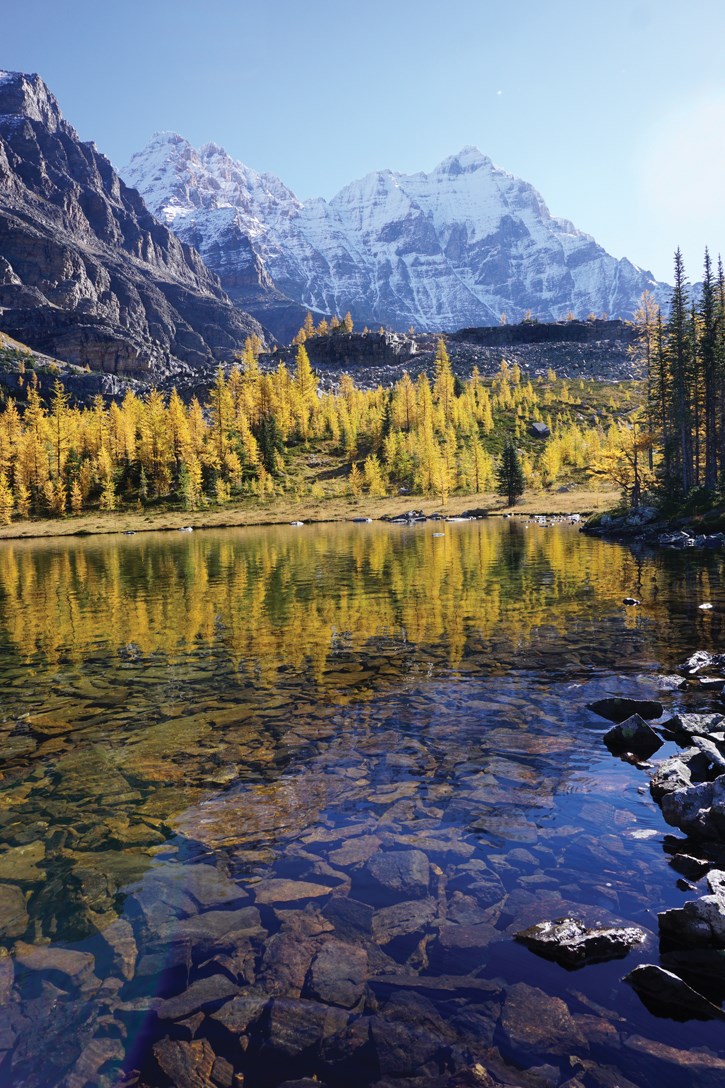BANFF – A lottery system has been recommended for the day use quota at Lake O’Hara – one of the region’s treasured gems.
A quota system is in place to limit the number of visitors using the public bus service into Yoho National Park’s Lake O’Hara to protect this sensitive alpine area and provide a wilderness experience to visitors by avoiding overcrowding.
With the entire season selling out within minutes of the online reservation system opening in April, Lake O’Hara Trails Club has recommended Parks Canada consider allocating day-use spaces by online lottery.
Members of the club, who fully support a quota, say they believe demand for Lake O’Hara will keep increasing, noting the online booking system appears to have led to frustration and a perception of unfairness by many users.
“I don’t think the current system is unfair, but it’s not user friendly. We believe that people would find a lottery system more user friendly and easier to support,” said Leslie Taylor, the group’s president.
“I think that when a system sells out within minutes, people are always concerned, whether it’s because of the speed of their computer or someone else knowing how to work the system.”
Parks Canada officials say the agency is committed to maintaining the quota to protect the unique alpine environment and a quality backcountry experience, but is open to exploring options to allocate the limited spaces, including a lottery.
“That would be one option,” said Richard Dupuis, Parks Canada’s visitor experience manager for Lake Louise, Yoho and Kootenay.
“Currently, we’re not looking at changing the quota. This is about protecting the environment.”
In the 1970s, a day use quota of 40 people per day was set, and was promptly reduced to 36 people a day based on bus scheduling and reservations. Since then, the quota has crept slowly upward to incorporate guided groups, and demand keeps growing.
The current quota is set at approximately 240-300 people a day.
That includes 32 day visitors, 11 commercially guided day visitors, up to 90 campers, 48 guests at the Alpine Club of Canada run Abbott Hut and Elizabeth Parker Hut and 60 guests at Lake O’Hara Lodge.
In 2015, Parks went from a telephone booking system – where there was one operator dealing with a large volume of callers – to online bookings to try to make the reservation system better.
With the telephone system, access was staggered because hikers could only book their trip three months in advance of their travel date. If someone was unsuccessful on their preferred date there might be an option for another date.
With the new system, hikers can go online and book trips to the area for any time during the year once the reservation system opens. The entire season is sold out in a matter of minutes.
Dupuis said 17,000 people were on line when the system opened April 20. There are 3,348 available seats for the entire season and users can reserve up to six seats.
“We have thousands of successful reservations,” he said, noting they monitor the system closely to make sure there are no block bookings.
“This is a very popular area and demand will always surpass what we offer.”
Lottery systems are becoming more common throughout the world, particularly in the United States, such as for Half Dome in Yosemite National Park and The Wave, a sandstone rock formation, in Arizona.
Taylor said there is already precedent at Lake O’Hara given the Alpine Club of Canada administers a lottery system for Elizabeth Parker Hut.
“I can give you a list of examples. I think people are accustomed to a lottery system for scarce resources,” she said.
“In Alberta, someone wanting a hunting licence for a particularly highly esteemed species is used to applying through a lottery.”
The group recommends Parks starts with a simple lottery, with an option for future enhancements such as future-year weighting for those who have been unsuccessful, or saving a few spots for an on-site, same-day lottery for last-minute arrivals.
While recommending a day-use lottery system, Taylor said the trails club is open to other discussions.
“I do want to emphasize that we as a club whole-heartedly support the quota,” she said.
“Even if that that means I don’t get to go to Lake O’Hara, I still support the quota because we believe protection of the area is so important and the quota has kept it special.”
Walking up the 11-kilometre road to Lake O’Hara has always been an option, too.
An increase in walk-ins is of concern to the Lake O’Hara Trails Club, as these people are often hiking beyond the lakeshore and can basically double the number of day users in the area.




